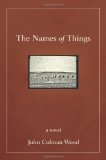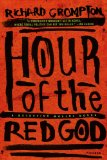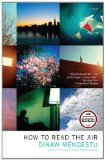Summary | Excerpt | Reviews | Beyond the book | Read-Alikes | Genres & Themes | Author Bio

John Colman Wood's fieldwork on the Gabra nomads of the Chalbi Desert (see "beyond the book") - particularly his knowledge of their death rites - forms the foundation for the anthropologist's first novel, The Names of Things.
Like the author, the novel's protagonist (never identified beyond "he") is also an anthropologist who has studied the Gabra. The plot traces his reflections as he returns to the desert looking for solace following the death of his wife from an unnamed disease she contracted in the Kenyan outback. The book is an exploration of grief, love, and the roles ritual and community can play in coping with overwhelming loss.
The Names of Things is a beautifully written book permeated with a sense of sadness and regret, set against the backdrop of the desolate Kenyan landscape. There are two main reasons why I find myself recommending this novel. First, the author's ability to vividly describe a setting is among the finest I've encountered. It takes a great deal of skill to pull readers into an unfamiliar landscape and make them feel like they've truly been there -- and Wood has that talent in abundance. The Names of Things is a feast for all the senses; the author describes not only the sights of Kenya but the sounds, smells and feel of the place as well.
Even before they reached Abudo's camp it was too dark to see, and he kept the path by following the camels' silhouettes against the stars. All day the windblown sand had chafed his skin. His neck and arms and calves prickled with sunburn. His feet, which had taken a beating on the rocks, ached...He cursed himself for coming...Then he heard the camp noises. Faint, windblown sounds. Clatter of pots. Wooden camel bells. Tinny voices of women and children, like old songs on the radio. He smelled wood smoke and dust and the musky odors of large animals.
Second, while Wood maintains in his afterword that The Names of Things is fictional, the story feels intensely real and personal. In fact, his descriptions of how the book's main character cared for his dying wife, and of his subsequent grief are painted with so fine a brush that it's difficult to believe that the story is not based on personal experience. Strong emotion is rarely a part of my reading experience, but I found myself deeply affected by the visceral nature of the protagonist's grief. The fact that a reader could care so much about an unnamed character is a strong testament to the exceptional quality of the author's prose.
In spite of the author's clipped writing style, the novel is not a quick read. The overall tone is elegiac and reflective as the main character revisits times spent with his wife and comes to terms with her death. So much of the narrative revolves around the past that there's not a lot of forward momentum to the story. Also, the vivid descriptions demand to be savored; you simply can't rush through them and enjoy this novel.
Readers should be aware that this is not an upbeat story; one never gets the sense that the main character has achieved a sense of peace. Not every book needs to have a happy ending of course, but there are no answers here, no neat wrap-up, and those who prefer tidy, optimistic conclusions may find the plot somewhat frustrating.
That said, readers who relish contemplative, open-ended literature and those who enjoy novels simply for the quality of an author's prose will want to put The Names of Things on their lists; Wood's first effort is both brilliantly written and genuinely moving. Book groups in particular will find much fuel for discussion here, and those looking for a book with some depth will want to pick up a copy of this fine debut novel.
![]() This review
first ran in the July 25, 2012
issue of BookBrowse Recommends.
This review
first ran in the July 25, 2012
issue of BookBrowse Recommends.

If you liked The Names of Things, try these:

by Richard Crompton
Published 2014
The Maasai believe in two gods. Enkai Narok, the Black God, is benign. Enkai Nanyokie, the Red God, is the god of anger, vengeance, and death.

by Dinaw Mengestu
Published 2011
A heartbreaking literary masterwork about love, family, and the power of imagination, which confirms Mengestu's reputation as one of the brightest talents of his generation.






Your guide toexceptional books
BookBrowse seeks out and recommends the best in contemporary fiction and nonfiction—books that not only engage and entertain but also deepen our understanding of ourselves and the world around us.